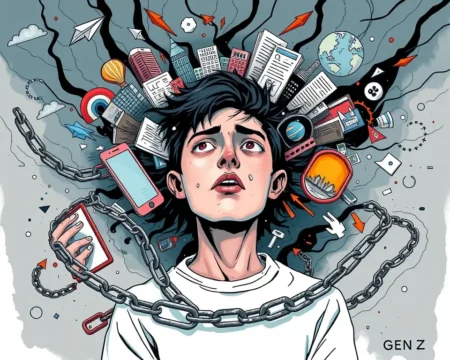Generation Z is redefining traditional career paths with a new trend called “micro-retirement.” This involves taking extended breaks from work to prioritize mental health and personal passions, rather than waiting for a traditional retirement age. But what exactly is it, and why is it gaining so much traction?
What is Micro-Retirement?
Micro-retirement is a period of extended time off from a full-time job, lasting months or even a year, used to recharge, travel, pursue hobbies, or simply rest and de-stress. It’s a proactive approach to managing burnout and improving overall well-being, allowing individuals to enjoy aspects of retirement earlier in life. Unlike a typical vacation, a micro-retirement is a significant break that allows for deeper self-discovery and personal growth.
Key Differences from Traditional Retirement
| Feature | Traditional Retirement | Micro-Retirement |
|—|—|—|
| Age | Typically 60s or later | Any age, often in 20s or 30s |
| Duration | Permanent cessation of work | Temporary break, with plans to return |
| Purpose | End of career, focus on leisure | Recharge, pursue passions, avoid burnout |
| Financials | Reliance on savings and pensions | Requires savings to cover expenses during the break |
Why is Micro-Retirement Popular Among Gen Z?
Several factors contribute to the popularity of this trend among Gen Z:
Mental Health Awareness
Gen Z is more open about mental health and prioritizing well-being than previous generations. They recognize the importance of taking breaks to avoid burnout and maintain a healthy work-life balance. The constant connectivity and fast-paced nature of modern work can be overwhelming, leading to increased stress and anxiety. Micro-retirements offer a way to disconnect and focus on mental and emotional restoration.
Dissatisfaction with Traditional Career Paths
Many Gen Z individuals are questioning the traditional notion of working continuously until retirement. They seek more flexibility, purpose, and meaning in their careers. Micro-retirements allow them to explore different interests, gain new experiences, and potentially pivot their career paths. This generation values experiences over material possessions and is willing to take risks to create a more fulfilling life.
Desire for Travel and Experiences
Gen Z values travel and unique experiences. Micro-retirements provide the opportunity to explore the world, immerse themselves in different cultures, and create lasting memories. Instead of waiting until retirement to travel, they are choosing to do it while they are young and have the energy to fully enjoy it.
Entrepreneurial Spirit
Many Gen Z individuals have an entrepreneurial spirit and use micro-retirements to pursue side hustles, start their own businesses, or develop new skills. This break from traditional employment allows them to explore their passions and potentially create alternative income streams. The flexibility of micro-retirements aligns well with the desire for autonomy and control over their careers.
Social Media Influence
Social media plays a significant role in promoting the micro-retirement trend. Influencers and content creators share their experiences of taking extended breaks, inspiring others to consider the same. The visibility of these stories normalizes the idea of taking breaks and challenges the traditional work-centric culture.
Potential Benefits of Micro-Retirement
Micro-retirements can offer several benefits:
- Reduced Burnout: Taking a break from work can significantly reduce stress and prevent burnout.
- Improved Mental Health: Time off can improve mental and emotional well-being.
- Increased Creativity: Stepping away from routine can spark creativity and innovation.
- New Skills and Experiences: Micro-retirements offer opportunities to learn new skills and gain unique experiences.
- Career Clarity: Time away from work can provide clarity about career goals and aspirations.
- Improved Relationships: More time to spend with loved ones can strengthen relationships.
- Personal Growth: Micro-retirements can facilitate self-discovery and personal development.
Potential Drawbacks and Considerations
While micro-retirements can be beneficial, it’s important to consider the potential drawbacks:
Financial Implications
Taking extended time off requires financial planning and savings. Individuals need to ensure they have enough money to cover living expenses during the break. This may involve budgeting, reducing spending, or finding ways to generate passive income. Without proper planning, a micro-retirement can lead to financial strain and stress.
Career Impact
Taking a break can potentially impact career progression and future earning potential. Some employers may view extended breaks negatively, while others may be more understanding. It’s important to consider the potential impact on career trajectory and be prepared to explain the break to future employers.
Re-entry Challenges
Returning to the workforce after a micro-retirement can be challenging. It may require updating skills, networking, and adapting to new workplace environments. The job market may have changed during the break, requiring individuals to be flexible and adaptable in their job search.
Social Stigma
Despite the growing popularity of micro-retirements, some may still view them as unconventional or irresponsible. Individuals may face criticism or judgment from family, friends, or colleagues who adhere to traditional work ethics. It’s important to be prepared to defend the decision and educate others about the benefits of taking breaks.
How to Plan a Successful Micro-Retirement
Planning is crucial for a successful micro-retirement. Here are some key steps:
- Define Your Goals: Determine what you want to achieve during your break. Do you want to travel, learn a new skill, start a business, or simply relax and recharge?
- Assess Your Finances: Calculate your expenses and determine how much money you need to save. Create a budget and explore ways to reduce spending and increase income.
- Create a Timeline: Decide how long you want your micro-retirement to last and create a timeline for your activities.
- Inform Your Employer: If you plan to return to your current job, discuss your plans with your employer and explore the possibility of taking a leave of absence.
- Plan Your Activities: Develop a plan for how you will spend your time. This could include travel itineraries, course schedules, or business plans.
- Stay Connected: Maintain connections with friends, family, and professional contacts during your break.
- Be Flexible: Be prepared to adjust your plans as needed. Unexpected events may occur, requiring you to adapt and be flexible.
- Reflect and Evaluate: At the end of your micro-retirement, take time to reflect on your experiences and evaluate whether you achieved your goals.
The Future of Work and Micro-Retirements
As Gen Z continues to enter the workforce, the micro-retirement trend is likely to become more mainstream. Employers may need to adapt their policies and practices to accommodate the changing expectations of younger workers. This could include offering more flexible work arrangements, sabbatical programs, and mental health support.
The rise of micro-retirements reflects a broader shift towards prioritizing work-life balance and employee well-being. As technology continues to blur the lines between work and personal life, it’s becoming increasingly important for individuals to take proactive steps to manage stress and prevent burnout. Micro-retirements offer a way to do just that, allowing individuals to enjoy a more fulfilling and sustainable career.
Conclusion
Micro-retirement represents a significant shift in how younger generations approach work and life. It is a proactive strategy for prioritizing mental health, pursuing passions, and creating a more balanced and fulfilling life. While it requires careful planning and consideration, the potential benefits of reduced burnout, improved well-being, and increased career clarity make it an appealing option for many Gen Z individuals. As the trend continues to gain momentum, it is likely to reshape the future of work and challenge traditional notions of career progression and retirement.










